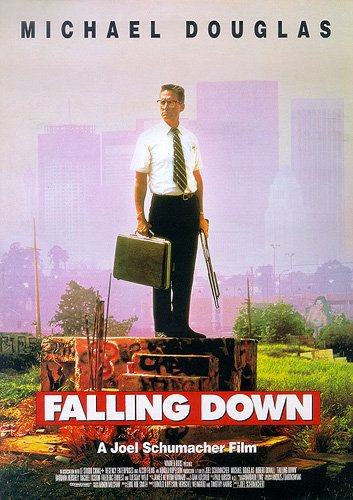| MD: The Norwegian left wing author Magnus E. Marsdal recently published the book Frp-koden (2007), where he discusses why and how the extreme right wing came to dominate Norwegian politics, functioning as the new working class party. In his analysis he focuses on how the left wing's contempt for the right wing voters - repeatedly claiming how stupid and uncultivated these people are - have made them an easy catch for the right wing populists who deliberately then have tried to represent the common man's “uncultivated” interests. I guess some of the same disdain for the “stupid” is also evident in Michael Moore's films. His films and books have become popular in Europe, partly I think, through presenting to us a stereotypical image of “the stupid white American man”. But as some have commented, his films might have worked counterproductive in the US, where the right wing easily can play the elitist-card, saying: “we are the party for those the left call the stupid, common man”. JH: Yes, that is exactly how it works! MD: The anti-intellectual atmosphere that has been quite strong in the US public sphere has also been evident in the Nordic countries. How do you think we can counter this anti-intellectualism? JH: That takes me back to my new project, which is about thinking about alternative knowledge in alternative places. What is anti-intellectualism about? Well, it is a fear that a particular class of people who have better access to education and to institutions of education, that those people will simply rule in a world where intellectualism is the currency. So anti-intellectualism can be class-based, it can be a critique of the privilege of education, and it should be taken seriously as something other than just rampant stupidity and ignorance. This is why you have to not be too suspicious of the popular. So for me, I then go to a popular archive and say, well, what are these mass-cultural texts that actually do appeal, do circulate, and do have sort of complex forms, and do contain different kind messages? Can we pull different kinds of intellectual practice from this material that many, many people actually are familiar with? It is an old argument in popular culture studies that to be suspicious of the popular is an intellectual arrogance on the part of academics, and simply locks academics into an eternal struggle with an anti-intellectual populace, who fear that the academics are sneering at them, when in fact, the academics are sneering at them! And they sneer at them by saying that “this film is stupid!” “Don't you know who Jackson Pollock is?” “Haven't you listened to Beethoven?” We do not live in a world anymore where we believe that high culture would save us. That was the intellectual conceit of the first half of the Twentieth Century, that with the right kind of cultural training, the world would be more civilized. And the most civilized country in Europe - Germany - became the place of barbarity to the soundtrack of Wagner. So we do not believe in that high-low split in the same way anymore. |  | 
| 
|  |  | 
MD: Today we see a cultural return to the eighties, not only fashion and music, but also in Hollywood, where macho-heroes such as Rambo, Rocky, and John McClain from Die Hard are back. Richard Goldstein has termed this figure the “neo-macho-man”, and linked it to Bush's war in Iraq. What are your thoughts on this change in masculinity in the US public sphere after 9/11? And what effects do you think this has had on the American society? JH: I think it is a very real account. It is not just in the imagery. We can go back to the sort of stupid masculinity of Bush. A world event like the bombing of the World Trade Center on September 11 happens, and this world leader's response is this sort of cowboy rhetoric about “we're gonna root them out”, “we're gonna hunt them down”, you know. I will never forget that imagery, and sort of thinking: oh my god, this is the beginning of the end. This is unfortunately the price that we do pay for a particular kind of anti-intellectualism. This is where it does come home to roost, because in the place of a sort of reasoned and considered account asking: my goodness, what is this political situation that we have gotten ourselves into? How can we understand it? What could we do about it? How should we respond to it as a people, as a nation, or actually as a collapse of a nation? Instead you get that macho rhetoric. In the five or six years since then, not only have we seen the return of the macho-man in films, we have seen a return of all kinds of bad political behavior in general. Many people have talked about a sort of carte blanche being given to homophobes, sexists, and bigots, because the political culture of the moment is not careful, basically. So some of these school shootings you see in the US, like the Virginia Tech shootings, the media latched on to the fact that the guy was Korean-American, which may have some significance, but more importantly, this is a return to the 1980s shootings. There was a whole series of schoolboys shooting particularly girls, in Midwestern states - in these red states, Republican states. What that signals to me is that we are living in a culture where men believe they are entitled to something, and when that something does not materialize, they think someone has to pay. It is like going to the 1980s with those horrible films like Falling Down, with Michael Douglas, where the white guy looks around him and says: “Hey, where did all these immigrants come from, what happened to my Californian, Arian, sun worshiping, white people's culture”, and takes a Uzi and walks around in these neighborhoods of color blowing people away. We have returned ... no, it is not even a return; it is a new version of male entitlement that comes with an extreme expression of male violence at every outlet of the political culture. So I would go way beyond the films, and be like ... wow! |  | 

|  |  |  | 
|  |  | 
|  | | 
|  |  | MD: These days it seems legible to talk about a “remasculinization of America”, which makes a critique of the ideology of masculinity more important than ever. What role do you think queer theory and activism can have in problematizing this remasculinization? JH: I think it is queer theory and feminist theory that is needed. It is very hard to get these perspectives into public discourse. That is the problem. So you have this guy going around shooting people feeling ignored or that something was denied him, and it is hard to insert a political discourse that is not just like “this was just a one crazy dude who went off”, but getting a more considered analysis of why male rage takes this form. That is a feminist question. Why is it a feminist question? Because no other political subject probably would ask that question in that form: Why does male rage take this form? Female rage takes a form of maybe child abuse, sometimes, maybe self-mutilation, maybe anorexia, maybe schizophrenia. It does not take the form of a woman picking up a machine gun and blowing people away. It really does not. We are hard pressed to think of such an event anywhere. So it seems like one of the distinguished features of the ones performing these acts of mass slaughter is maleness. And there I would say a feminist analysis is necessary, and almost impossible to get in the public sphere, because feminism is an afterthought, or considered to be a historical artifact at this point. MD: Yes, the anti-feminist position is dominant today... JH: It is, even if almost every city seems to have a feminist art show going up, anti-feminism rules. It is really puzzling. |  | | 
|  |  | 
|  |  |
|